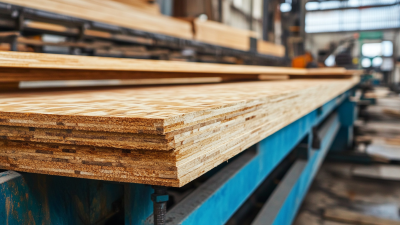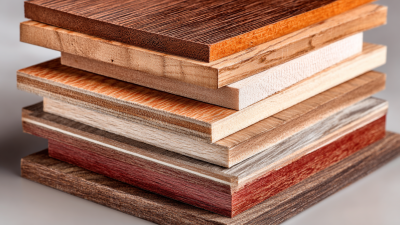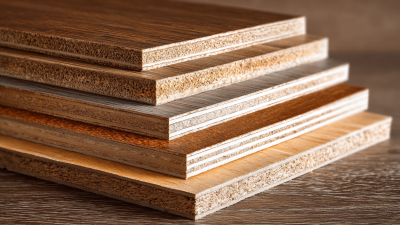When embarking on a construction or woodworking project, selecting the right plywood supplier can significantly influence the outcome and overall success of your endeavor. Plywood is a versatile and essential material widely used in various applications, from furniture making to structural support. Therefore, understanding the key factors that determine a reliable plywood supplier is crucial. These factors may include product quality, availability, pricing, customer service, and the supplier's industry reputation.

By carefully considering these elements, you can ensure that you partner with a plywood supplier who not only meets your material needs but also supports your project goals effectively. This guide will explore the essential criteria that should influence your choice of plywood supplier, enabling you to make an informed decision that aligns with the specific requirements of your project.
When selecting the appropriate plywood supplier for your project, understanding the different types of plywood and their specific applications is crucial. Plywood can be broadly categorized into two types: softwood and hardwood. Softwood plywood, typically sourced from coniferous trees, is widely used in construction due to its availability and cost-effectiveness. On the other hand, hardwood plywood, derived from deciduous trees, offers superior strength and aesthetic appeal, making it ideal for furniture and cabinetry. According to industry reports, the global plywood market is projected to grow significantly, driven by increasing demand in the construction and industrial sectors.
Furthermore, the application of plywood varies significantly between new construction and rehabilitation projects. For new construction, durability and compliance with building codes are paramount; hence, a supplier that offers high-quality, certified plywood is essential. In rehabilitation projects, the focus may shift towards the ability to blend with existing structures and achieving specific design criteria. The right supplier understands these diverse needs, providing products that meet both functional and aesthetic requirements, thereby ensuring the success of your project.
This bar chart illustrates the various types of plywood and their applications in projects. Understanding these factors and their significance can aid in making informed decisions for successful project outcomes.
When selecting a plywood supplier, evaluating their reputation and experience in the industry's landscape is imperative for ensuring the success of your project. A supplier's reputation often reflects the quality of their products and service. Researching customer reviews and testimonials can provide valuable insights into their reliability and responsiveness. Additionally, consider reaching out to previous clients to gauge their satisfaction and the supplier’s ability to meet deadlines and specifications.

Experience in the plywood industry is another critical factor that should not be overlooked. Suppliers with a long-standing presence are likely to have established relationships with manufacturers, ensuring better quality control and access to a wider range of products. Their seasoned expertise also means they are more adept at handling potential issues that may arise during supply chain management. Therefore, when assessing potential suppliers, look for those who possess a strong track record, demonstrate industry knowledge, and maintain a commitment to customer service.
When selecting a plywood supplier, assessing quality standards and certifications is crucial for ensuring the durability and reliability of the products for your project. Many suppliers claim high quality, but without verified standards, these claims can be misleading. Look for suppliers who comply with recognized certifications such as the American Plywood Association (APA) or the International Organization for Standardization (ISO). These certifications indicate adherence to rigorous testing and manufacturing processes, ensuring the plywood meets specific performance criteria.
Additionally, it's essential to inquire about the sourcing of the wood and environmental certifications, like the Forest Stewardship Council (FSC) label. This not only reflects responsible forestry practices but also enhances the sustainability narrative of your project. By prioritizing suppliers with these quality standards and certifications, you can make informed decisions that safeguard your project's integrity and contribute to long-term success.
When selecting a plywood supplier, price comparison plays a crucial role in determining the overall cost-effectiveness of your project. Different suppliers often offer varying prices for similar products, influenced by factors such as quality, brand reputation, and sourcing practices. Start by gathering quotes from multiple suppliers, ensuring you are comparing like-for-like options to get an accurate sense of the market rate. Look for any additional costs, like delivery fees or minimum order quantities, which can affect your budget.
Cost-effectiveness is not solely about the lowest price; it also involves evaluating the quality of the plywood relative to its cost. Investing in higher-quality plywood may result in lower long-term expenses due to durability and reduced waste during projects. Additionally, consider the supplier’s customer service and reliability, as these can impact project timelines and final costs. A supplier who provides consistent quality and timely deliveries may save you money and stress in the long run, making them a smarter investment even if their initial prices are slightly higher.
| Supplier | Plywood Type | Thickness (mm) | Price per Sheet ($) | Grade | Availability |
|---|---|---|---|---|---|
| Supplier A | Birch | 18 | 45.00 | A | In Stock |
| Supplier B | Oak | 15 | 50.00 | B | 2 Weeks |
| Supplier C | Pine | 12 | 30.00 | C | In Stock |
| Supplier D | Maple | 19 | 55.00 | A | 1 Week |
| Supplier E | HDF | 25 | 40.00 | B | In Stock |
When selecting a plywood supplier, evaluating their customer support and delivery options is crucial for ensuring smooth project execution. Research indicates that 70% of project managers rank reliable communication and support as essential in supplier evaluations. Suppliers with robust customer support systems not only respond quickly to inquiries but also provide technical assistance, which can prevent costly delays during the construction phases.

Moreover, the efficiency of delivery options plays a significant role in project timelines. According to industry reports, projects that experience material delays can see an increase in costs by up to 40%. Therefore, identify suppliers that offer flexible delivery schedules and trackable shipments. A judicious approach may include assessing their logistics capabilities, such as partnerships with freight carriers and fulfillment centers, which can lead to faster turnaround times. Prioritizing these factors will contribute significantly to achieving project success while minimizing potential disruptions.






